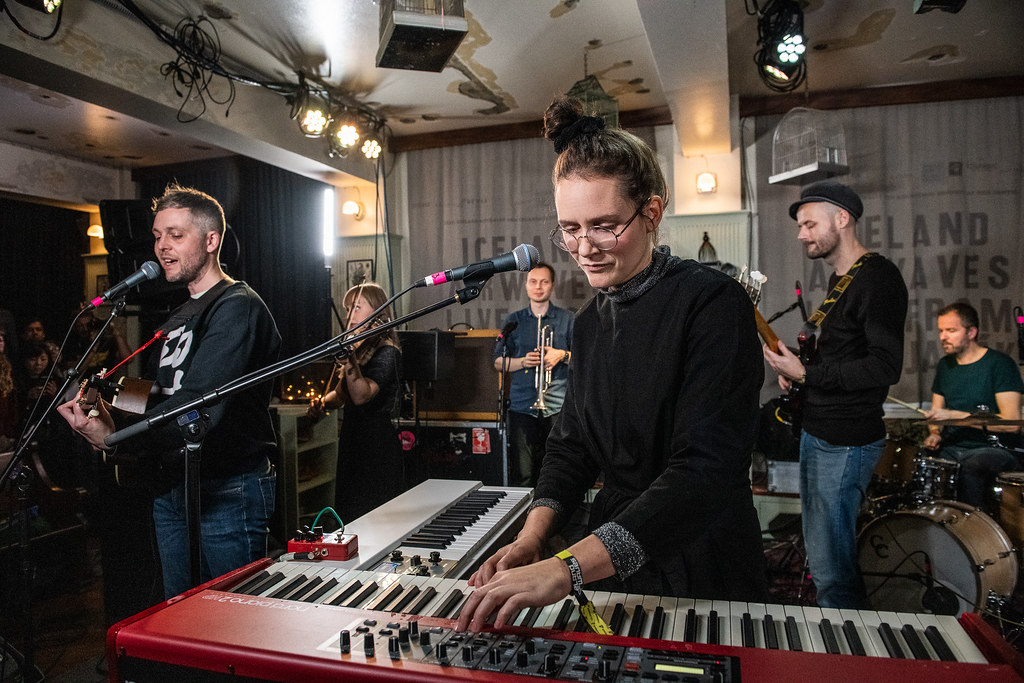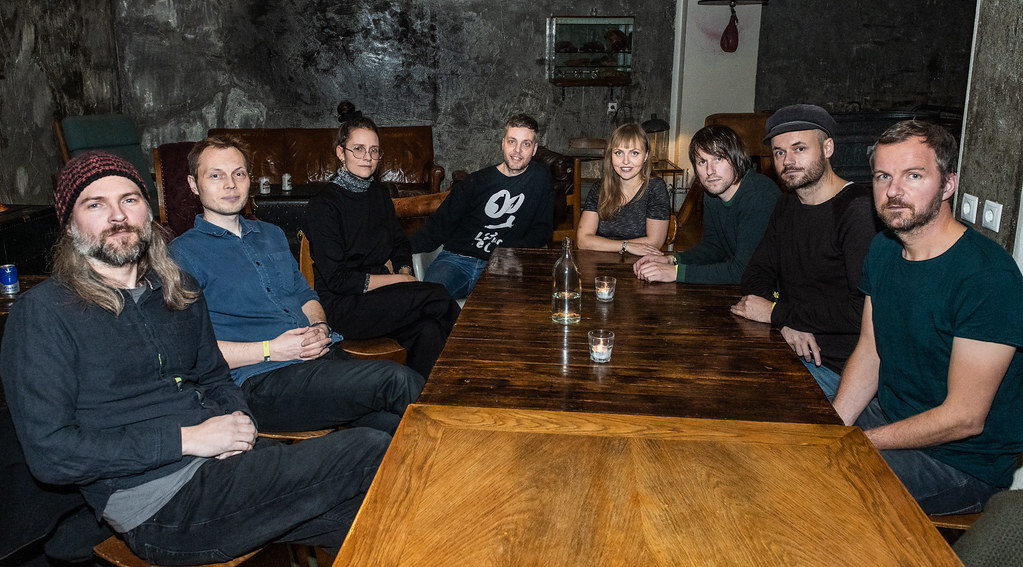
Just before Seabear made their return to the Iceland Airwaves in 2019, they’d dropped their first song in nine years, “Waterphone.” Though the passage of time rolls on, excitement for Seabear has only grown. When the group played the Kex Hostel stage not only was the room at max capacity but so was a telecast of the performance in Kex’s basement and there was a line going around the block.
As if there were any doubt, Seabear rose to the occasion with a triumphant homecoming. It was the best sort of reunion set you could hope for. The band retained the glow and magic that brought in fans in their early year but also kept a mind toward the future, playing two new songs. The seven-piece group’s dazzling symphonic, folk arrangements sound just as fresh and enchanting as they did when their debut The Ghost Carried Us came out in 2007. You can see for yourself in the video below.
While Seabear was on hold for the bulk of the previous decade, the band members continued to be active with Sóley Stefánsdóttir venturing into a solo career, Sindri Már Sigfússon leaning into his solo project Sin Fang, Guðbjörg Hlín Guðmundsdóttir performing on records with artists like Júníus Meyvant and Ólöf Arnalds, just to name a few. Having stretched out with all these new musical experiences, Seabear is back and arguably stronger than ever.
After the group’s performance at Iceland Airwaves, we caught up with Sigfússon to catch-up on what the band’s been up to in its downtime, what it’s like starting things back up again, as well as his insights on what makes Iceland’s music scene so unique.
KEXP: It's been about nine years since the last Seabear album. What have you been up to this whole time? I know you all have different projects, but what? What's been happening in that time gap?
Sindri Már Sigfússon: I've continued making music under the name Sin Fang. I released one album while Seabear was still active under that name. So I just kept that going. I have just been making music since then but in different various forms. [I've] been working as a composer for TV shows and movies. I had a brief stint in making music for commercials and producing other people's stuff. I mean, I'd just been doing music in various forms and most of us have. Me and Soley actually never stopped playing together. We always had some sort of collaboration going. Almost all of us have been doing music since we decided to take a break, and we also have made like three 10 children between us. So, making babies, making music.
You recently returned with a new song, "Waterphone," which you played today. What was it like getting back in the studio again together and what brought you back together?
I mean, we were always friends and we'd go out to eat and stuff like that. I think the last time we had a band dinner, we were like, 'What do you think Seabear would sound like now?" Because obviously, we've all like changed as people and musicians. So we thought it would be funny to do some new music. Then like somehow the word got around. Airwaves asked us basically pretty soon into the recording of the first material if we wanted to play Airwaves. We were like, 'sure.' Then the months then flew by and all of a sudden we had to play here. It was just a spontaneous, fun idea. It was never like we quit or anything. In 2010, we did like 160 shows or something. We toured from the beginning of January and had our last show in December. So maybe we were just a bit burnt out or something. At the time, me and Soley as well were juggling solo careers. It was a bit too much at the time to be doing all of that at once. Then the years just kind of flew by and all of a sudden it's nine years since we took a break.

Does it feel different now? When you came back together, did it feel like you just got right back into the rhythm of things since you've been friends this whole time? Or musically, did it feel different?
Not really. It kind of just fell into place pretty quickly and [we] just kind of started making Seabear songs – something that none of us would have done individually with our own individual projects. I think because we spent the first like two years of the band's life just touring a lot that, we played together a lot. We have this kind of understanding between members of how we work. It was surprisingly easy to make new songs. And they still sound like the band. It's never a given when bands come back together again and make new material. Sometimes it can feel like they kind of become a parody of themselves if they're doing the same stuff they were doing when they were young. So I hope we don't fall into that category [laughs]. But no, it wasn't difficult at all. It was just fun.
Can you tell me a little bit about that song, "Waterphone," and how that came about and the writing process of that? I know you were making a joke on stage about the title, too.
So basically needed the title and we all just had bad titles for it. There's mention of a phone and water in the thing and I like that instrument, waterphone, which is like an instrument you use for horror movies. It's like a circle with like these metal spikes and you bow them and you get [makes screeching noise] this weird horror sound. So that's kind of where the name came from. But waterphone is a bit of a mouthful. Yeah, it's the weird word.
But yeah, it's just this one song in a batch of songs that we've been working on. We had decided to release a song before Airwaves and that was just the song we ended up releasing – because probably it was the furthest along in the writing and recording process. The song was kind of came through... I think I just did a demo with some chords and vocals and then jammed it together kind. My brother when he heard it – he made the video for it – he was like, 'Yeah, it sounds really Seabear-y!' We have a few different studios now that we work for from. Some of it is recorded at my place and some of it was recorded at Kjartan [Bragi Bjarnason]'s art space– they have a little recording setup in there because they live in the same street and Soley has her own studio. It's funny, we live pretty close, but a lot of the communications goes through our closed Facebook group or whatever. It was fun. It was pretty effortless song to make and I think we just fell right back into the rhythm we were in.

You mentioned that you all have other projects. Does having other projects impact your writing with Seabear? Did you all bring new things to the band when you came back together?
I think we have certain ideas for Seabear that we wouldn't do in our solo stuff. I think we all probably have gotten [to be] better musicians over the years, like technically, at least me. Also, we're all pretty settled down compared to our earlier years. I have this theory that the tamer the band is on stage, the more insane the backstage is. [In the past] we would all go in party mode, which now we're just having soup after the show and relaxing. Yeah, we've all probably changed as musicians and people. But there's still this muscle memory in your brain from playing – I don't know how many shows we played, but it was like maybe like 500 or something – so we know each other musically pretty well.
You're all obviously pretty embedded in the Iceland music community and it appears to be very tight-knit and close with musicians playing in multiple bands and each other's projects. What do you think fosters this and what makes Iceland's scene so unique?
I don't know. This is kind of maybe just the normal for us growing up here that everyone collaborates, helps each other out. I think like there's little point in competition in Iceland because the market is so tiny. There's no money to be gained or whatever. So people, I think, tend to help each other. And if you know, someone that plays an instrumental does something that you don't, you can call them and then you maybe owe them a favor to do something else like that. Some of my friends from London and other places talk about how nice that is. That they might be from such a scene where it's very competitive and people don't help each other out because there's a lot of people competing for the same slots or things or whatever. So I think that's probably one of the reasons why people just help out. And also maybe something in our culture. I mean, just like 60 years ago, it was quite rough living in Iceland. Like food-wise, weatherwise. Our grandparents, if we have old grandparents, they still remember people living in mud huts. So it's not that far away. You're two generations [from] where you need to help each other to survive. In farming and rural communities, you have to help your neighbor. I've gotten a similar question a lot of times about why there's a lot of music in Iceland and I don't really know the answer to that. But sometimes I think it's also something to do with the size of the scene. It's not really cool to sound like some other Icelandic band. So you have to carve out your own identity within this little scene here. If there was a band that came out now that sounded like Sigur Ros or something, they would kind of just be dismissed. So I think that's maybe one part of the reason why there's a lot of times interesting stuff going on here.
You mentioned you're working on a batch of songs. You played another new song tonight. Is a new album on the way? Anything else we can expect next from Seabear?
Yes, there's a new album. I mean, we haven't finished writing it, but we have some songs and our goal is to release it in 2020. My new album, the Sin Fang album, comes out tomorrow, 8 of November. But yeah. So we're working on it. And it's been fun.

Watch the band's performance from Iceland Airwaves 2019.
Watch her performance for Iceland Airwaves 2019 during KEXP's broadcast from Kex Hostel.
Watch the Icelandic band's performance from Kex Hostel Iceland Airwaves 2019 and read an exclusive interview .